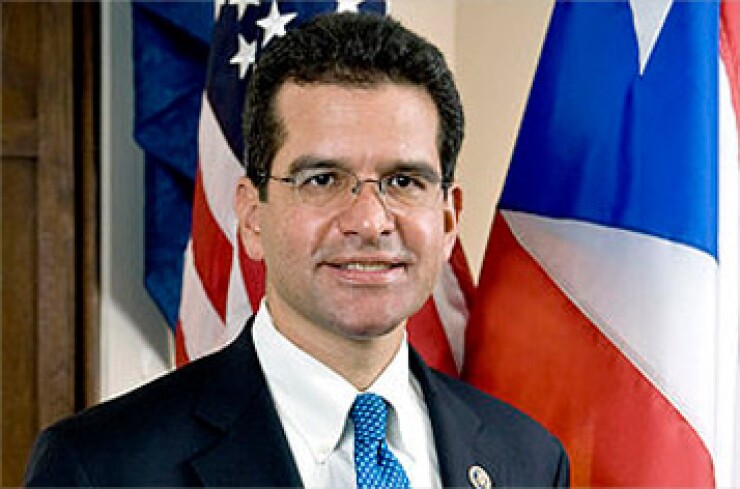
WASHINGTON – Congress should further debate the effectiveness of Securities and Exchange Commission and Municipal Securities Rulemaking Board rules governing the failure to comply with municipal securities disclosure requirements, a congressional task force on Puerto Rico recommended.
The recommendation was made in a report the Congressional Task Force on Economic Growth in Puerto Rico sent to Congress on Tuesday.
"The task force observes that Puerto Rico has too often missed its continuing disclosure obligations to provide audited financial statements," the members of the task force wrote. The commonwealth's failure to meet such obligations may have contributed to an inability of all stakeholders to fully understand the nature and extent of Puerto Rico's economic and fiscal challenges in a timely manner, they added.
"The task force encourages further debate in Congress about the efficacy of SEC and MSRB rules and regulations governing failures to meet disclosure requirements," they said.
The recommendation comes on the heels of a bill introduced earlier this month by Rep. Gwen Moore, D-Wis., to shift municipal disclosure responsibilities to issuers and borrowers from underwriters. The bill would authorize the SEC to establish baseline mandatory disclosure requirements for issuers and borrowers, including on content and timing, for primary offerings. But it would leave room for the commission to vary the requirements for different classes of issuers or borrowers.
That is a complete reorientation from the current disclosure regime, which puts disclosure responsibilities on underwriters. The SEC cannot directly regulate muni issuers, but it can take enforcement action against them for violating securities antifraud laws. Under the SEC's Rule 15c2-12 on muni disclosure, dealers and banks cannot underwrite an issuer's bonds unless that issuer has contractually agreed to disclose financial and operating information at least annually and material events as they occur.
Additionally, issuers' continuing disclosure agreements are contracts with bondholders. If an issuer fails to comply with its agreement, bondholders must take some sort of action, such as litigation, to remedy the situation. The rule appears to be toothless in that it is unrealistic to think that bondholders would sue. Retail investors would not have the resources and typically bondholders do not know each other's identities.
The SEC has no authority to take action if an issuer fails to meet its agreement. Under its Municipalities Continuing Disclosure Cooperation initiative, the SEC went after issuers for falsely claiming they were complying with their continuing disclosure agreements under the securities antifraud laws.
Issuers have said they would fight against legislation such as Moore's and warned that the change could drive some issuers out of the muni market.
The members of the task force did not mention the bill or the possibility of putting disclosure responsibilities on issuers. But their report said that timely disclosure helps investors make informed decisions about investments in municipal bonds, including instances in which material changes to an issuer's financial condition occur, and helps protect them against fraud involving bonds.
The disclosure recommendation appears in the investor protection portion of the report. In that same section, the task force also recommended that Congress pass the U.S. Territories Investor Protection Act of 2016, a bill sponsored by Rep. Nydia Velazquez, D-N.Y., which would repeal the current exemption that investment companies in the U.S. territories have from the Investment Company Act of 1940.
The report also contains recommendations on health care, such as creating parity with the U.S. states on Medicaid, federal tax policy toward individuals and businesses on the island, including extending the child tax credit to Puerto Rico families with one or two children, and technical assistance from the Treasury Department.
The task force is chaired by Sen. Orrin Hatch, R-Utah, and also includes Sens. Marco Rubio, R-Fla., Bill Nelson, D-Fla., and Robert Menendez, D-N.J. Velazquez, Sean Duffy, R-Wis., Tom MacArthur, R-N.J., and Pedro Pierluisi, D-P.R. are also on the task force.
The members said in a joint statement that "the task force is of the view that Puerto Rico's best days lie before it, not behind it."
"The members of the task force have worked across party lines to identify steps that can be taken to help Puerto Rico's economy stabilize and grow," they said. "The task force hopes that its work will serve as a platform for continued bipartisan efforts to support the American citizens in Puerto Rico."
Pierluisi, whose term will end in January, said in a separate statement that the report "will serve as a blueprint for action for the next Resident Commissioner and the next Congress as a whole."
"I think it is a fitting capstone to my congressional career," he said.
Velazquez said it is incumbent on the new Congress to begin enacting the recommendations quickly.
The task force was established under PROMESA and was tasked with writing a report by the end of the year that identified impediments to growth and recommended change to promote long-term economic growth and stability, spur new job creation, reduce child poverty, and attract investment to Puerto Rico. The members received 450 submissions from the public about impediments and needs in the territory and organized meetings with a variety of stakeholders, according to the release.





